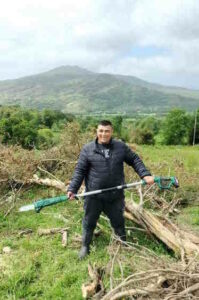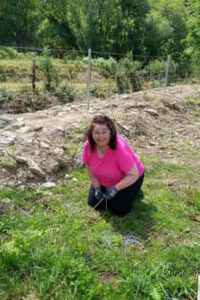
Mohammed is a young man who has learned many skills. He loves technical and building jobs on the farm, like building wood storage, fencing etc. He sees his brothers go to school and work. He always says that social farming is his ‘work’.
Tracy loves all animals on the farm. She helps me with feeding, grooming and playing. A bubbling personality, she brings sunshine and happiness to the farm.

What is Social Farming
Social farming, also known as care farming, uses farms, gardens, and other agricultural settings to provide therapeutic, educational, and community-based services for individuals who may benefit from them. Social farming offers a wide range of benefits, including:
Improved mental health: Social farming can help individuals who are struggling with mental health issues, such as depression and anxiety, by providing a calming and peaceful environment. Working with animals and plants can also promote feelings of purpose and accomplishment, boosting self-esteem and confidence.
Increased physical activity: Many social farming programs involve physical labour, such as gardening or animal care, which can provide a valuable source of exercise for individuals who may be sedentary or have physical disabilities.
Community engagement: Social farming can help individuals feel more connected to their local communities by providing opportunities to work with others and participate in community-based activities.
Skill-building: Social farming can provide valuable training and skill-building opportunities, such as learning how to grow food, care for animals, and operate farm equipment.
Improved quality of life: Social farming can provide a sense of purpose and meaning for individuals who may feel isolated or disconnected from society. Social farming can improve overall quality of life by providing meaningful work and social interaction opportunities.
Overall, social farming offers a unique and valuable approach to promoting physical, mental, and social well-being while supporting local agriculture and community development.

